在美国人寿保险指南的上一篇专栏文章:子女教育基金计划一览(一)中,我介绍了一些比较过时的教育基金计划,旨在帮助大家避开这些很容易不小心就在网上开了账户的“恐龙坑”。今天的这篇文章中,我会继续分析到两种更灵活、更适用于现在学费增长速度的计划,并在文章末尾进行了对比,希望可以帮助各位家长理清选择。
5. 529计划介绍(合格学费计划 Qualified Tuition Plan)
随着学费每年的增长,州政府开始着手推出有税收优惠的教育基金计划,以鼓励家庭为子女教育提前储蓄,并在一定程度上留住原州住民继续在州内接受高等教育。529计划自2001年来,逐渐成为市面上接受程度较广,也最为华人年轻家长们了解的教育基金储蓄计划。
529计划由每个州的政府,以及州内的高等教育机构独立运作,所以不少州会对州内居民有一些税收上的优惠和奖学金的优待。
529计划分为两类,预付学费计划以及储蓄计划。2015年美联储的数据显示,全美共有108种不同的529计划,储蓄型的计划占比80%。其中纽约、弗吉尼亚和内华达三个州的总和占529计划总资产的35%。最新的数据显示,529账户中的平均存款为6万美金左右,差不多是现在私立大学一年的学杂费用总和。529教育基金作为父母的资产,会对孩子今后申请奖助学金产生影响。
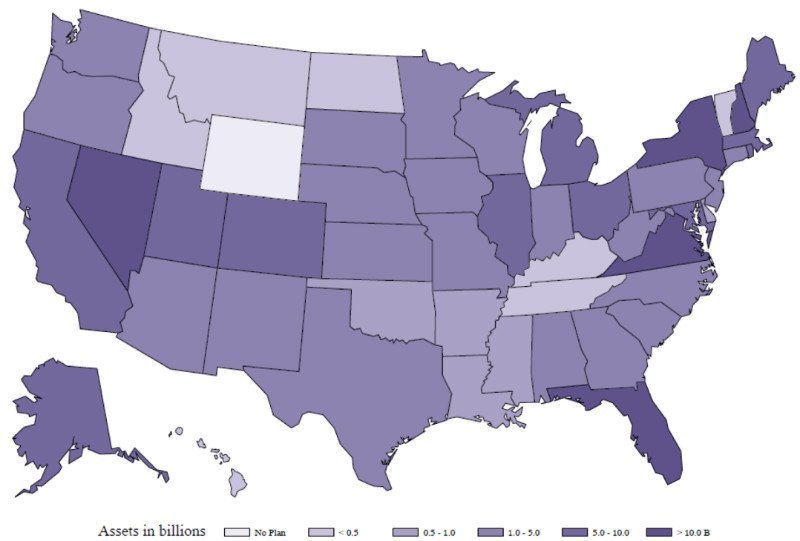
全美各州529计划资金数据
下面来具体讲讲两类529计划的具体操作。
- 预付学费:顾名思义就是提前购买了州内公立、私立大学的学分费用,以抵御学费的增长。举个例子,小明两岁,离上大学还有16年。如下图所示,等到他上大学的时候,公立的学费四年将近20万,私立将近45万。小明的爸爸妈妈爷爷奶奶提前帮他以两岁时候的学分费用购买了州内某符合要求的大学16年后的学分。
这笔钱由州政府进行管理,在州政府的信托中做共同基金或者债券的投资。这个计划的限制在于,如果小明今后考到了外州或者不在计划合作院校之列的学校,这笔预存的学费会打折扣。
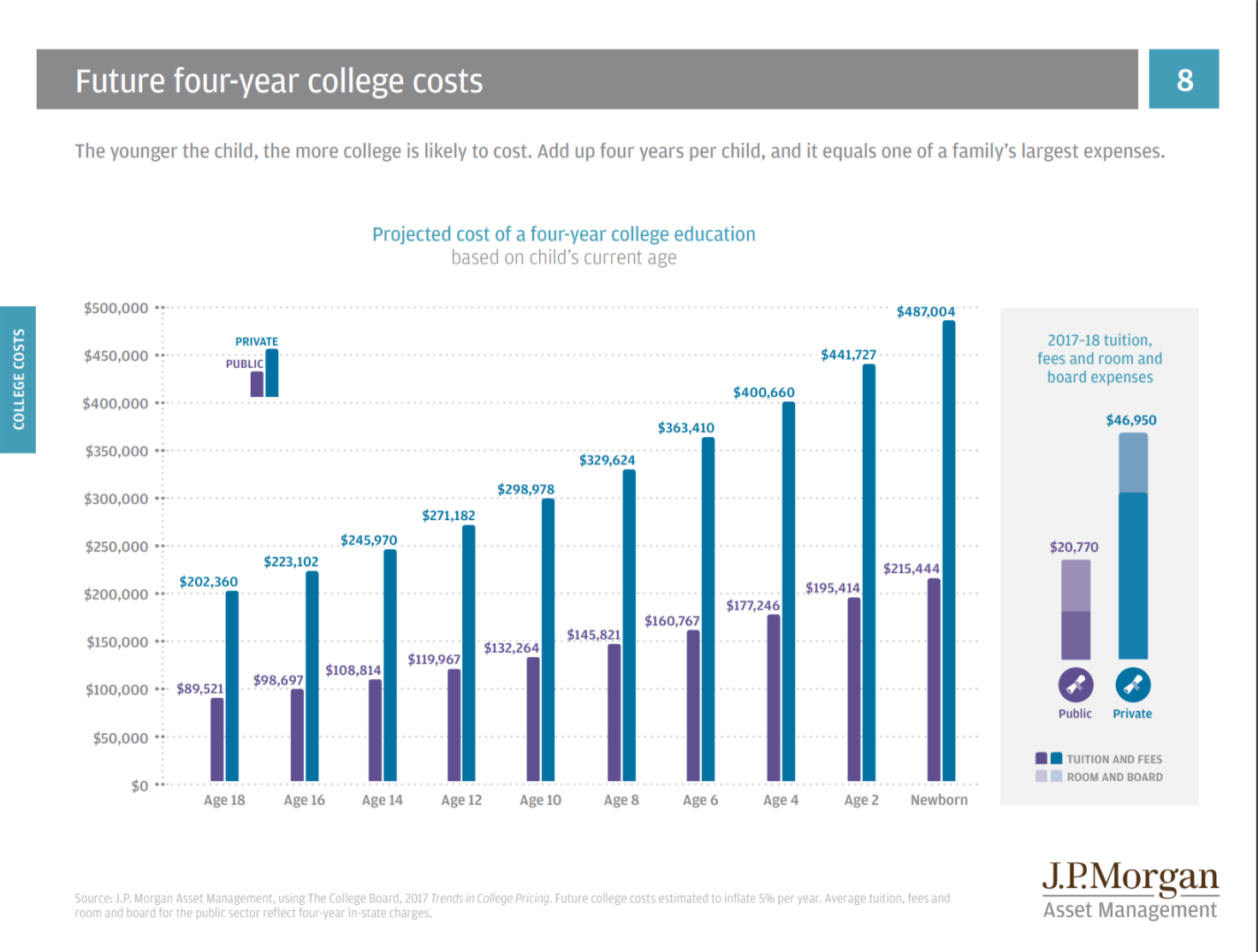 JP Morgan大学学费预测数据表
JP Morgan大学学费预测数据表
- 储蓄计划:第二类计划相当于是一个专为高等教育所做的Roth IRA。放入储蓄计划中的资金,会由州政府投放在指定的共同基金及债券中,严格说来不允许个人进行投资,只能在计划内自行选择投放比例。
跟据金融服务公司Morningstar提供的数据,现有的529计划中,每个账户下所选的投资组合从5种到345种不等,每个账户的平均投资组合在20个左右。其中超过60%的投资在股票市场。另有少量债券和现金。
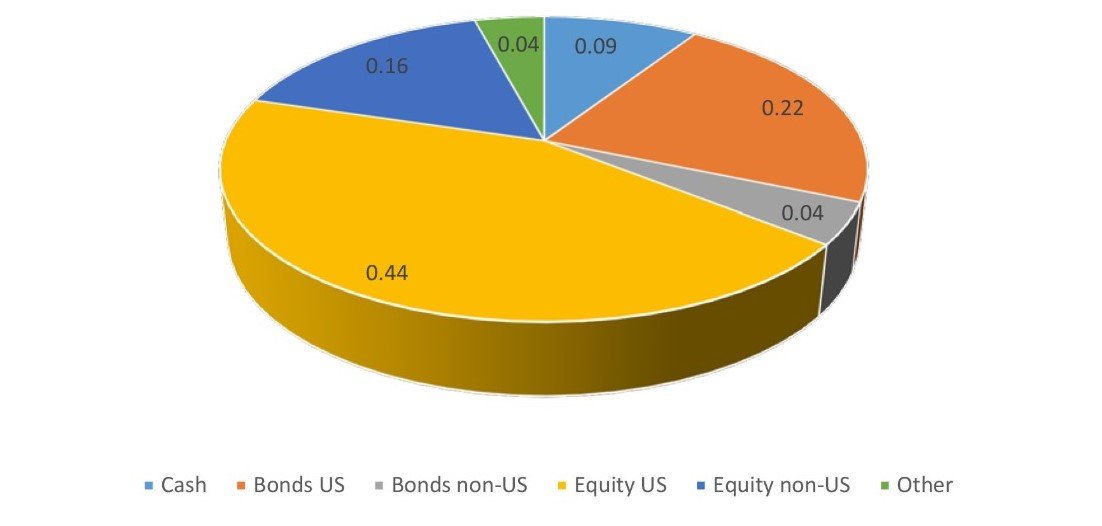
如何选择和购买529计划?
529计划可以从州政府直接购买,也可以从银行或者金融规划师那里购买。
收费方面,由于529计划的分发渠道广泛,加之可选择的投资组合非常多,因此并没有一个统一的标准。
直接购买的计划,各项服务费和花销占总金额的0.13%-1.05%之间,第三方机构开户的费用占总金额的0.58%-1.88%之间,不同计划收取的费用不同。今年,美国金融界的监管机构(FINRA)已经通过各大媒体放出风声,开始对各大代理公司的529计划收费加强监管。
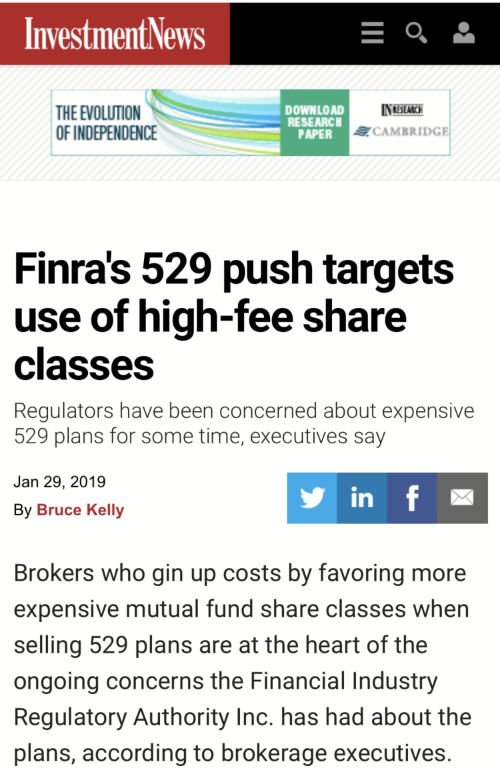
2019年关于加强529计划监管的新闻
额度限制:每年放入529学费储蓄计划中的钱有一个“合理的上线”。这个通常是预估未来学费的费用,以美国最贵的私立大学的学费作为最高额度。
税收方面:放入529计划中的钱为税后现金。增长的收益如果用于高等教育的学费、生活、书本费则享受免税优惠。
受益人:赠予人不一定要是受益人的家人,任何人都可以放钱。账户由一个成年人管理,受益人通常是会用到这笔学费的人。每年可以更改。
 Source: For student loans, Federal Reserve Bank of New York Consumer Credit Panel/Equifax. For savings and prepaid plans, Morningstar
Source: For student loans, Federal Reserve Bank of New York Consumer Credit Panel/Equifax. For savings and prepaid plans, Morningstar
在上面这幅图中我们基本上可以看出,教育基金计划和学生贷款的增加基本上成同样比例的,例外的情况出现在2008年。2008年的股市震荡和金融危机导致了529计划中投资在债券和共同基金中的资金的缩水,教育储蓄金也随之减少。如果孩子是在这一年上大学而家里又拿不出更多的预算,可能就需要背一些学生贷款了。
6. 现金值人寿保险教育基金方案
有现金价值的人寿保险,是从上世纪40年代左右开始进入市场的。其后也因为市场的发展和演变出现了不同种类的产品。其中1997年过后出现的指数型万能险IUL以其存取的灵活性、保底功能及收益免税的一些利好优势,逐渐被应用在为孩子做教育基金规划上。
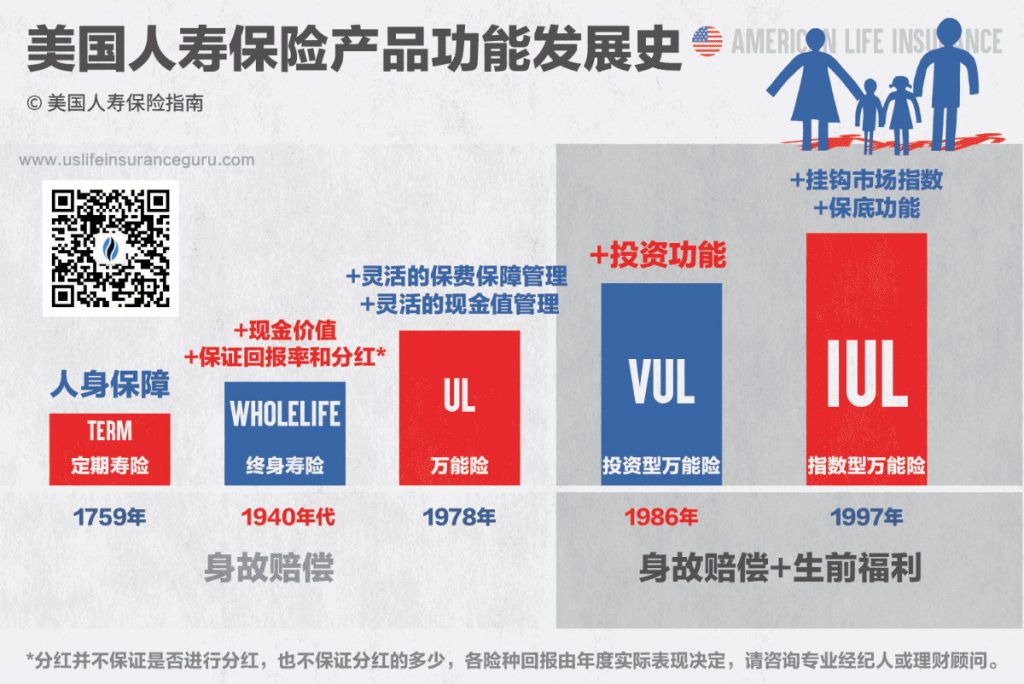
首先,我要强调人寿保险最重要的功能,也是每一位投保者的初衷是出于对家庭和爱人的保障。商业保险承担了政府医疗和养老的重担,相应的也为投保者及受益人提供了免税的收益和高杠杆的“回报”。
美国保险公司有800多家,每家公司有不同的产品,不同的投资策略,我们不可能在这篇文章中逐个比较。以指数型产品为例,通常都会有对标标普500的策略选择,不直接参与市场。市场好的时候收益增长有封顶(10%-12%左右),市场跌的时候保底锁利在0%。
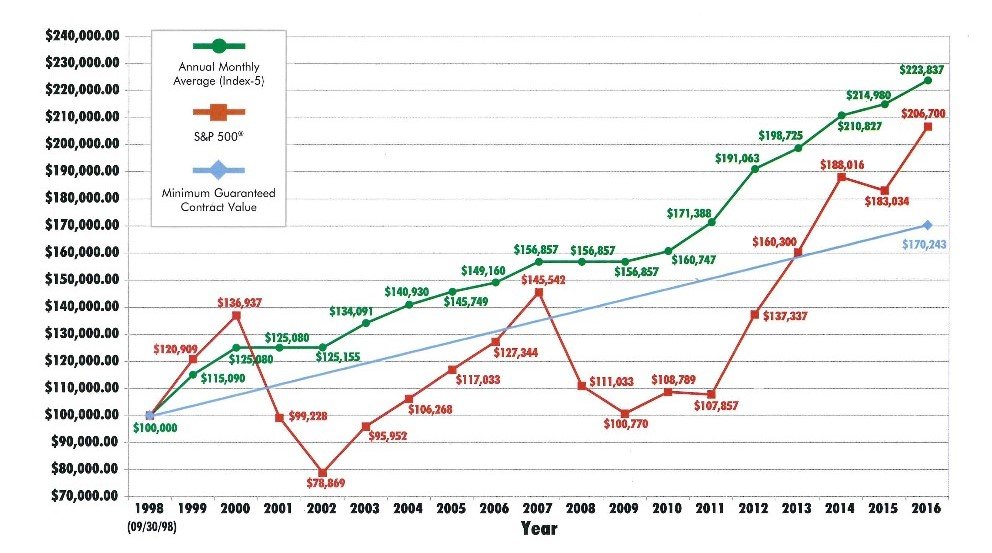
以1998年存入$100,000为例的股市投资收益和保单收益的走势对比
不同年龄阶段有不同的保单设计方式,以一位3岁男童为例:
- 某公司投保100万的保单,从3岁开始每年存$8000,存15年。
- 18-21岁上学的时候每年可以拿出$4万做教育金补充。
- 这笔钱不影响申请奖助学金。
- 30岁可以拿出$7.5万作为买房头款或创业启动资金。
- 65岁开始每年还可以拿出超过$15万的免税退休金,一直拿到90岁。
- 不同家庭预算不同,孩子的年龄不同,均可量身定制。
额度限制:每张保单每年可存入的上限由IRS国税局决定,根据投保人年龄、保单面额有所不同。基本的规则是保额越大额度越大,年龄越大额度越大。
税收方面:放入保单的钱为税后现金,在不超过国税局对每个保单所规定的最高额度的前提下,保单现金值。
受益人:孩子成年之前由父母作为保单持有人,成年后可以转给孩子。保单一辈子提供保障和现金值积累,生故的时候生故理赔金传承给后代。
529计划和寿险教育金计划功能对比
| ESA/529计划 | 寿险教育金计划 | |
| 免税 | ☑️ | ☑️ |
| 增值收益 | ☑️ | ☑️ |
| 保底 | ❌ | ☑️ |
| 影响奖/助学金申请 | 影响 | 不影响 |
| 持续性 | ❌ | ☑️ |
| 使用限制 | 有 | 无 |
| 重大疾病/伤害保障 | ❌ | ☑️ |
| 身故保障 | ❌ | ☑️ |
小结
从前文所介绍的Custodial Account,Coverdell储蓄账户/ESAS,教育债券,教育储蓄信托四种方式,到本文分析的529计划 和 用寿险现金值做教育计划,都是美国市场上比较成熟的解决方案。如果您需要根据自己家庭的财务情况规划子女的教育金,请寻求专业的经纪人进行设计方案了解。
推荐阅读:
01. 大学学费存哪里?529计划和寿险优缺点比拼
02. 2018大学学费暴涨,如何规划子女大学教育基金?
03. 子女教育基金计划一览(一):如何避开“恐龙坑”



